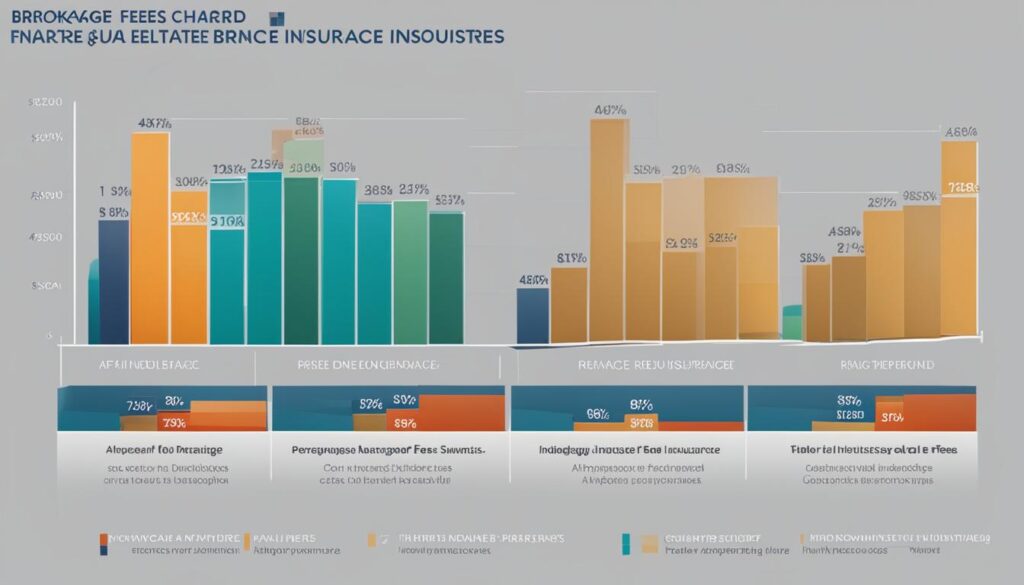The maximum commission a broker can charge varies depending on the industry and type of broker. In the real estate industry, the average commission is typically between 5% and 6% of the total sale price. This commission is usually split between the listing agent and the buyer’s agent, with each receiving 2.5% to 3%. However, commission rates are negotiable, and some brokers may charge higher or lower fees. It’s important for buyers and sellers to research and negotiate commission rates to ensure they are getting the best deal possible.
Key Takeaways:
- The maximum commission a broker can charge varies by industry and type of broker.
- In real estate, the average commission is typically between 5% and 6%.
- Commission rates are negotiable, and it’s important to research and negotiate to get the best deal.
Understanding Real Estate Agent and Broker Fees
When it comes to buying or selling properties, real estate agents and brokers play a crucial role. They are professionals who are compensated for their services through commissions. These commissions are usually a percentage of the total sale price and can vary between 5% and 6%. Agents and brokers work on behalf of their clients, providing services such as passing offers, working with other agents, and handling all the necessary paperwork.
The commission structure is typically divided between the listing agent and the buyer’s agent, with the listing broker and buyer’s agent’s broker also receiving a share. This division ensures that all parties involved in the transaction are compensated for their efforts. It’s important for buyers and sellers to be aware of these fees and understand how they are distributed.
Table: Real Estate Agent and Broker Fees
| Party | Commission Percentage |
|---|---|
| Listing Agent | 2.5% to 3% |
| Buyer’s Agent | 2.5% to 3% |
| Listing Broker | 0.5% to 1.5% |
| Buyer’s Agent’s Broker | 0.5% to 1.5% |
It’s worth noting that these commission rates are not set in stone. They are negotiable and can vary depending on factors such as the type of property and the current market conditions. Buyers and sellers have the opportunity to research and negotiate commission rates to ensure they are getting the best deal possible and maximizing their investment.

Fees Associated with Real Estate Commissions
When buying or selling a property, it’s important to understand the fees associated with real estate commissions. These fees are typically paid to the brokers who facilitate the sale and are responsible for distributing the commission to their respective agents. The average commission rate in the real estate industry is between 5% and 6% of the total sale price, although this rate is negotiable.
The commission is typically split between the listing agent and the buyer’s agent, with each receiving a percentage of the total commission. In addition, the listing broker and the buyer’s agent’s broker also receive a share of the commission. This means that the seller is usually responsible for paying the commission, although the buyer’s agent’s commission is often included in the purchase price.
A visual representation of the commission distribution is provided in the table below:
| Commission Distribution | Percentage |
|---|---|
| Listing Agent | 2.5% – 3% |
| Buyer’s Agent | 2.5% – 3% |
| Listing Broker | 0.5% – 1% |
| Buyer’s Agent’s Broker | 0.5% – 1% |
It’s important for buyers and sellers to be aware of these fees and to negotiate when necessary. By understanding the fees associated with real estate commissions, you can make informed decisions and ensure you get the best deal possible.
Summary:
- Real estate commissions are typically between 5% and 6% of the total sale price.
- The commission is usually split between the listing agent, the buyer’s agent, the listing broker, and the buyer’s agent’s broker.
- The seller is usually responsible for paying the commission, although the buyer’s agent’s commission is often included in the purchase price.
- Buyers and sellers should understand these fees and negotiate when necessary.
Factors Influencing Real Estate Commission Rates
Regarding real estate commission rates, several factors can influence the final amount you pay. Understanding these factors can help you negotiate a fair rate and ensure you get the best deal possible. Here are some key factors to consider:
1. Market Conditions
The current state of the real estate market can have a significant impact on commission rates. In a seller’s market where demand is high and inventory is low, agents and brokers may be able to command higher commission rates. On the other hand, in a buyer’s market with more competition among agents, commission rates may be more negotiable. It’s important to stay informed about market conditions and use this knowledge to your advantage when negotiating commission rates.
2. Property Type and Value
The type and value of the property you are buying or selling can also influence commission rates. Higher-priced properties may command higher commissions due to the increased complexity and potential for larger profits. Commercial properties and luxury homes often have higher commission rates compared to residential properties. Similarly, properties that require extensive marketing or specialized knowledge may also come with higher commission rates.
3. Negotiation Skills
Your own negotiation skills and the willingness of the agent or broker to negotiate can play a role in determining the commission rate. It’s important to be prepared and confident when negotiating commission rates. Research comparable properties, understand the services provided by the agent or broker, and be willing to make a compelling case for a lower rate. Remember, commission rates are not set in stone, and there is often room for negotiation.
By considering these factors and being prepared to negotiate, you can influence the commission rate you pay for real estate services. Remember that commission rates should reflect the value and services provided by the agent or broker, so it’s essential to find the right balance between cost and quality.
Haven’t Made Up Your Mind Yet? Reach Out To Us And Make The Switch To Houstir Inc!
Our managing brokers and agent success team are eager to assist you throughout the entire process.

| Factors | Description |
|---|---|
| Market Conditions | The current state of the real estate market can impact commission rates. Agents may be able to command higher rates in a seller’s market. |
| Property Type and Value | The type and value of the property can influence commission rates. Higher-priced or specialized properties may come with higher rates. |
| Negotiation Skills | Your own negotiation skills and the willingness of the agent or broker to negotiate can affect the commission rate you pay. |
By understanding these factors and taking them into account, you can navigate the world of real estate commission rates more effectively and ensure you are getting a fair deal.
Selling Without an Agent: For Sale By Owner (FSBO)
While many people choose to work with a real estate agent or broker when selling their property, alternative options are available for those who prefer a more hands-on approach. One such option is selling the property without the assistance of an agent, commonly known as a For Sale By Owner (FSBO) transaction. This allows the seller to control the selling process and avoid paying agent fees fully. However, it’s important to understand the implications and responsibilities of selling without an agent.
When opting for an FSBO sale, sellers must be prepared to handle all aspects of the sale themselves. This includes tasks such as marketing the property, scheduling and conducting showings, negotiating offers, and managing the paperwork to close the deal. It requires a significant amount of time, effort, and expertise in the real estate market.
While selling without an agent can save money on commission fees, it does come with potential challenges. Without the guidance of an experienced agent, sellers may struggle with accurately pricing their property, effectively marketing it to potential buyers, and navigating the complexities of the negotiation and closing processes. It’s essential for sellers considering an FSBO sale to thoroughly research and familiarize themselves with the local real estate market, as well as the legal requirements and paperwork involved in the transaction.

While real estate brokerage fees are commonly known, it’s essential to recognize that brokerage fees exist in other sectors as well. In the finance industry, brokerage fees play a vital role in facilitating trading activities and maintaining investment accounts. Brokers charge fees for executing trades, providing market research, and offering investment advice. The exact fee structure may vary depending on the type of broker and the level of service provided. For example, full-service brokers may charge higher fees but offer personalized investment guidance, while discount brokers may offer lower fees but fewer services.
Similarly, in the insurance industry, brokerage fees are charged for the services provided by insurance brokers. Insurance brokers work on behalf of clients to find the most suitable insurance policies and negotiate the terms and premiums. They earn their fees by receiving a commission from the insurance company when a policy is purchased. The specific fee structure may vary depending on the type of insurance and the complexity of the policy. It’s important for consumers to understand and compare brokerage fees when seeking insurance coverage to ensure they are getting the best value.
How Real Estate Brokerage Fees Are Determined
Real estate brokerage fees are determined by various factors that both buyers and sellers should consider. These factors play a significant role in negotiating the fees and understanding their value. When determining the appropriate brokerage fee, it’s essential to recognize the services and support provided by the brokerage. This includes MLS input and management, marketing and advertising, and access to professional services.
Some brokerages have set commission splits with their agents, while others may negotiate the fees based on the individual agent’s experience and performance. Buyers and sellers should carefully evaluate these factors when deciding on a brokerage fee that aligns with their needs and expectations. It’s important to balance the value provided by the brokerage and the cost incurred.
Factors such as the current market conditions and the level of competition among agents and brokers can also influence brokerage fees. In a competitive market, buyers and sellers have more leverage to negotiate lower fees. Additionally, the type of property and its location may impact the commission rates. For example, luxury properties may command higher fees due to the specialized expertise required.
Factors Determining Brokerage Fees
Haven’t Made Up Your Mind Yet? Reach Out To Us And Make The Switch To Houstir Inc!
Our managing brokers and agent success team are eager to assist you throughout the entire process.

When it comes to determining brokerage fees, several key factors come into play:
- The services offered by the brokerage include marketing, advertising, and access to professional networks.
- The experience and performance of the individual agent may warrant a higher or lower fee based on their track record.
- The current market conditions, such as the level of competition and demand for properties in a specific area.
- The type and location of the property, with luxury properties often commanding higher fees due to the specialized expertise required.
Understanding these factors and their influence on brokerage fees is crucial for buyers and sellers in the real estate market. By considering the value and services provided by the brokerage, negotiating when necessary, and carefully evaluating the different factors, individuals can make informed decisions and secure the most favorable brokerage fee.
| Factors Determining Brokerage Fees | Examples |
|---|---|
| The services offered by the brokerage | MLS input and management, marketing and advertising, access to professional networks |
| The experience and performance of the individual agent | Track record of successful sales, expertise in a specific area or property type |
| The current market conditions | Level of competition, demand for properties in the area |
| The type and location of the property | Luxury properties, specialized expertise required |
The table above provides a summary of the key factors that determine brokerage fees in the real estate industry. By considering these factors, both buyers and sellers can navigate the negotiation process more effectively and ensure they are getting the best value for their investment.

Ways to Save on Brokerage Fees
If you’re looking to save on brokerage fees when buying or selling a property, there are several strategies you can employ. Here are some effective ways to reduce your brokerage costs:
- Negotiate Lower Fees: One of the most common ways to save on brokerage fees is by negotiating lower rates with your agent or broker. Keep in mind that commission rates are often negotiable, especially in competitive markets. You can demonstrate the potential of a high-selling price or explore alternative fee structures to secure a better deal.
- Consider Discount Brokerage Options: Another option to save on brokerage fees is to work with a discount brokerage. These brokerages typically offer reduced commission rates or flat fees, allowing you to keep more money in your pocket. However, it’s important to thoroughly research and compare the services provided by discount brokerages to ensure they meet your needs.
- Shop Around for the Best Rates: Don’t settle for the first agent or broker you come across. Take the time to shop around and compare commission rates from different professionals. Look for agents or brokers who offer competitive rates without compromising on the quality of their services.
By implementing these strategies, you can effectively reduce your brokerage fees and maximize your savings when buying or selling a property.

Example Table: Comparison of Brokerage Fees
| Brokerage | Commission Rate | Additional Fees |
|---|---|---|
| Standard Brokerage | 5-6% | N/A |
| Discount Brokerage A | 3% | $500 administrative fee |
| Discount Brokerage B | 4% | No additional fees |
This table provides a comparison of different brokerage fees in the market. As you can see, standard brokerages typically charge a commission rate of 5-6%, while discount brokerages offer lower rates ranging from 3% to 4%. It’s important to consider any additional fees charged by discount brokerages, as they may impact your overall cost savings.
Conclusion
Understanding the maximum commission a broker can charge is essential for buyers and sellers in the real estate market. Commission rates are negotiable and can vary based on factors such as the type of property, market conditions, and the expertise of the agent or broker.
To ensure you are getting the best deal possible, it’s important to research and compare commission rates. Take the time to consider the value provided by your agent or broker and be prepared to negotiate. Remember, the commission is paid for the services and expertise provided, so finding the right balance between cost and quality is key.
By being informed and proactive, you can make sure that you are getting fair and reasonable fees for the services provided. So, as you navigate the real estate market, don’t hesitate to advocate for yourself and your financial interests.



